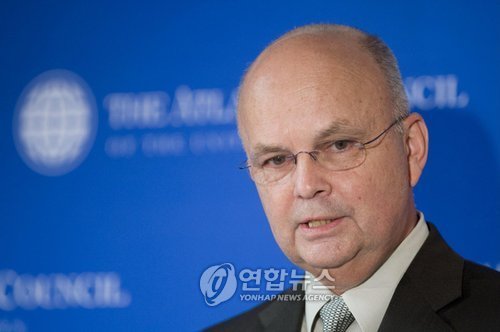Bringing US tactical nuclear weapons back to South Korea or relaxing restrictions on Seoul's civilian nuclear industry could be considered as a means to put pressure on China to work harder to get North Korea to give up its nuclear program, a former CIA director said Tuesday.
Michael Hayden, who served as CIA chief from 2006-2009, made the suggestion in an article to The Hill newspaper, expressing concern that the North will likely be able to "reach the Pacific Northwest with a nuclear-armed missile within a few years."
"By the end of Donald Trump's first term, we could be facing an isolated, pathological little gangster state able to obliterate Seattle," he said.
 |
(Yonhap) |
China should put a lot more pressure on Pyongyang, but Beijing is unwilling to do so because "it believes that current circumstances are tolerable, or at least more tolerable than potential instability, refugee flows or a unified Korea integrated with the West," he said.
"Beijing would rather live with today's painful toothache than chance the root canal or oral surgery. So we might want to allow the tooth to hurt more - not maliciously, but as a byproduct of steps logically taken because of North Korea's actions," Hayden said.
Hayden said the decision to put the THAAD missile defense system in South Korea was one of such measures.
"We'd probably want to make US missile defenses facing the Pacific Basin a lot stronger, too, even if it might begin to erode the deterrent value of China's modest nuclear force," Hayden said.
"We could even revisit the decision to pull American nuclear weapons out of South Korea, or the rate at which American nuclear-capable ships visit Chinese/Korean waters, or perhaps restrictions we have demanded be placed on South Korea's civilian nuclear industry," he said.
The US withdrew nuclear warheads from South Korea in the early 1990s and has since been providing "extended deterrence" protection for the Asian ally, which refers to the commitment to use nuclear weapons, if the need arises, to deter attacks on allies.
Doubling down on secondary sanctions on Chinese firms doing business with the North could also be considered, he said.
"This is all tough - and dangerous - stuff," he said. "But, to be fair, is there anything more dangerous than maintaining today's course?" (Yonhap)




![[Herald Interview] 'Trump will use tariffs as first line of defense for American manufacturing'](http://res.heraldm.com/phpwas/restmb_idxmake.php?idx=644&simg=/content/image/2024/11/26/20241126050017_0.jpg)


![[Health and care] Getting cancer young: Why cancer isn’t just an older person’s battle](http://res.heraldm.com/phpwas/restmb_idxmake.php?idx=644&simg=/content/image/2024/11/26/20241126050043_0.jpg)
